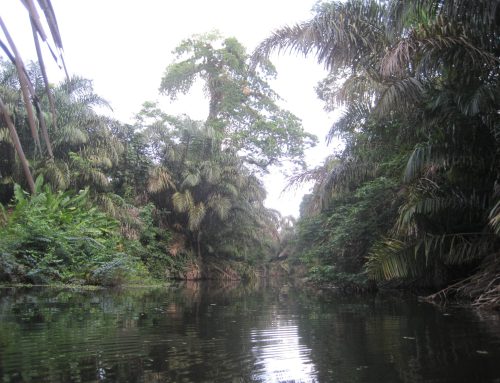By: Rachael Bell-Irving
Plastic is everywhere in our oceans and it’s going to take a deep, transformational change in humanity’s consciousness and activities regarding the oceans to ensure healthy, sustainable life on this planet.
Students across Canada came together this winter through video conference to address plastic pollution in the Ocean Wise National Dialogue on Plastics. Guided by the Centre for Global Education, these students have developed their knowledge and worked collaboratively with each other and their communities to develop real solutions to the plastic problem.

Denise Cymbalist, Graphic Designer at the Vancouver Aquarium, shares her expertise on how to communicate complex issues like plastic pollution to the public
Participating schools include:
- Harbour View High School (HVHS), Saint John NB
- David Suzuki Secondary, Brampton ON
- Sir John Franklin High School, Yellowknife NWT
- Robert Thirsk High School, Calgary AB
- Career and Technology Centre (CTC), Calgary AB
- ESSMV, St. Albert AB
- Sa-Hali Secondary, Kamloops BC
- Burnaby South Secondary, Burnaby BC
The youth truly are the future. They are the upcoming consumers, influencers, and change makers of the world. Through programs like the National Dialogue the students are given the opportunity to educate themselves and empower others to make a difference for their future; and these students are seizing the opportunity.
It was clear from the start that the students were well aware of the issue, and are invested in their futures. Throughout the program there have been some very empowering reflections:
“Single use plastic and a disposable society is a trend that we are used to, so let us change that trend. From paper straws to compost programs in schools and compostable coffee cups. We are faced with a mountain, but we can begin to move it simply by picking pebbles.” – Cailin Dueck, Kamloops BC.
“…plastic is a double edged sword. It can be convenient in an economic way, but the problem comes when we use it without any common sense.” – Juan Berasategui Gallego, Saint John NB
“We firmly believe that with the correct techniques and meaningful execution from a team of people that care about this issue, we can truly make a dent in the wall of plastics and waste in our waterways.” – Eric, Maria, Yuan, and Ethan, Calgary AB
For six weeks the youth connected regularly through video conferencing to discuss different aspects of the issue, and hear from expert mentors in the fields of research, sustainability and creative design to develop their understanding. The youth demonstrated their thoughtfulness on the issue, asking important questions about the future of research and the economics around plastic.
On November 8th these remarkable students prepared to address their own schools during the Virtual Town Hall. In this national event the students collected data from their peers to determine what changes the youth of Canada want to see our country take to tackle plastic pollution. By engaging their own communities these students are educating and empowering others to make the everyday steps to reducing single-use plastic waste across Canada.
On November 17-18, representatives from each school met at the Vancouver Aquarium, an Ocean Wise Initiative, for the Writers Retreat. Over the course of the weekend the students worked under the guidance of the CGE Coordinators to sift through all of the conversations from the virtual meetings, the online classroom, and the data collected during the Virtual Town Hall.
Based on this information the youth have created a draft white paper that will be presenting to a governing body in Canada. The document contains the policy, practice and societal changes that the youth of Canada believe the country should take in order to affect the impacts of plastic pollution. Education was the highest priority amongst the students, with policy change also a key part of the students’ recommended strategy.

Denise Cymbalist, Graphic Designer at the Vancouver Aquarium, shares her expertise on how to communicate complex issues like plastic pollution to the public
Over the following months the students will continue to collaborate as they edit and refine the document. In 2019 select students will have the opportunity to present this paper to a governing body in Canada, such as the School Boards or Senate.
To read more about the work the students are doing, visit www.education.ocean.org/oceanaction
If you would like to know more about the program, or inquire about participating next year, please contact us at: onlinelearning@ocean.org
Danika Strecko and Rachael Bell-Irving are the dynamic duo that make up the Online Learning Team. Online Learning is an international Initiative from Ocean Wise Education that connects students around the world with the ocean through digital technologies.https://education.ocean.org/
Leave a Comment
Never Miss Out
Sign up to receive notifications whenever we post a new article and stay updated on all things ocean!
[email-subscribers-form id=”1″]









